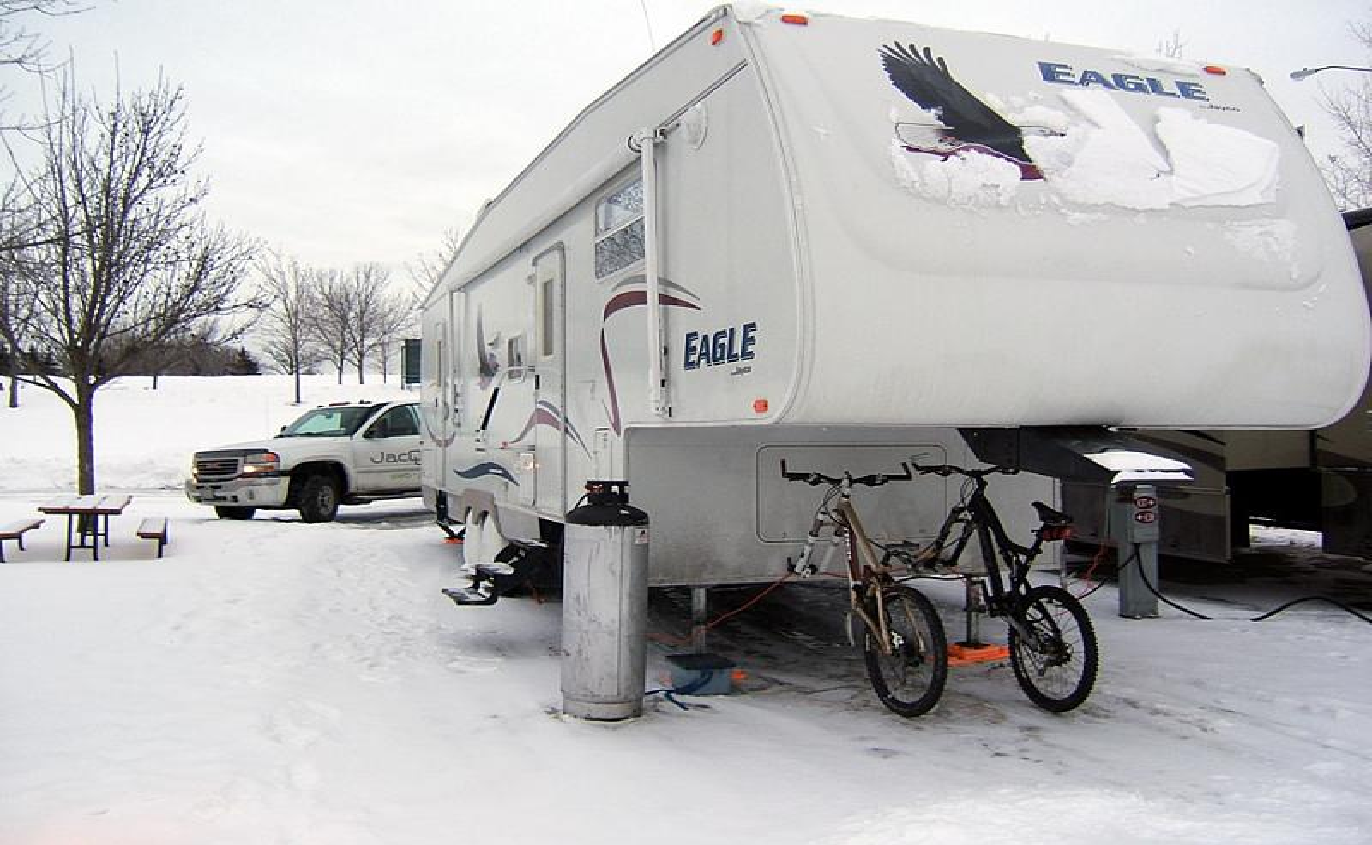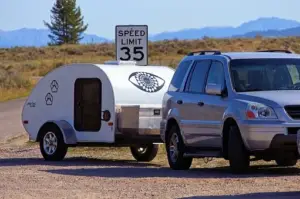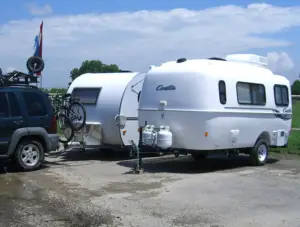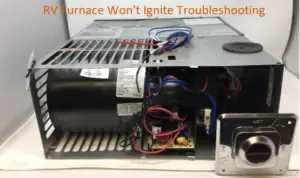Towing a travel trailer in snow requires extra preparations and care. This is because the winter snow usually makes towing more challenging due to slippery road conditions.
However, implementing certain tips can help you deal with cold climatic hazardous efficiently.
Tips for Towing a Travel Trailer in Snow
To effectively tow a travel trailer in snow, here are some of the most effective tips to consider:
1. Pick the Right Snow Tires
This is another vital tip that you should consider when planning to tow your travel trailer in snow. Pick the right tires that will ensure that your trailer can successfully perform in icy road conditions.
Understand that not all tires are the same and there are those that can in fact diminish the vehicle’s performance since they are strictly designed for use on dry roads.
The right type of tires will guarantee you an optimal driving experience and fewer chances of skidding off. Snow tires are effectively designed with larger studs and gaps in their treads that offer more traction and bite.
To get the best snow tires on the market, consider those products that have the 3-peak mountain display on the sidewall. These ones have undergone intense testing in severe weather conditions hence you are guaranteed optimal performance.
2. Get a Set of Snow Chains
To improve your vehicle’s traction and minimize the chances of skidding, consider buying a set of snow chains. If you are carrying a load, you need to realize that these chains will come in handy. This is because it isn’t easy to tow tons of weight without chains on icy roads. You will end up losing traction easily.
Snow chains are great in increasing traction and ensure that you and other drivers are safe on the road.
Note that in some other parts, it’s a requirement for all vehicles to be equipped with winter chains when conditions are snowy. However, when making purchases, you need to consider the size as well as the clearance type of your truck’s wheels.
3. Consider Your Trailer’s Brake Controller
The function of the trailer’s brake controller is to signify the brakes when and how hard to exactly press against the tires of the trailer in order to make a stop. It should be noted that under normal weather conditions, the brake controller will simply notify the trailer’s brakes when to significantly apply pressure to the trailer’s tires.
But, when you are towing a track in icy road conditions, then you definitely want the trailer’s brake to provide a lighter press against the wheels to minimize the chances of the wheels locking up in an already slippery road condition.
You should consider adjusting the brake controller to ensure that it’s at a minimum setting.
This will make it easier for you to slow down and brake on ice. Before you even hit the road fully, do several brake tests and try to apply pressure on the tires. This will help you determine if you need more pressure or make more braking adjustments.
4. Be Aware of Other Road Users
You won’t be the only driver on the road most of the time and you need to be aware of other road users. understand that not every road user is properly prepared to drive on icy road surfaces and some may even lack proper experience.
In this case, you should try and maintain a proper distance from other drivers.
Besides that, you should try to avoid driving closer to other vehicles, especially in the build-up and high traffic areas. This will help improve your safety as well as those of other drivers around you.
When driving, assume that you are the only driver with experience and this will mean that you should try to avoid the risk of collisions and accidents as much as you can.
Under perfect or normal weather conditions, you need to maintain a driving distance of more than 3 seconds from the next car if you are towing a trailer.
This is because trailers are already heavy and you, therefore, need more time to stop the vehicle compared to when you are simply driving the truck alone.
But the dramatic ice conditions on the road mean that the stop distance will be more. This is because the maneuverability and movement control of a heavy trailer demand more time in the snow.
5. Take Enough Rest
The difficult road conditions mean that you will take a longer time than usual to drive and tow your trailer. When you are tired or the road conditions are extremely severe, then it will be unsafe for you to continue towing the trailer.
Slow down and finding a good parking spot to rest. your journey might be delayed, but it’s better to arrive late than risk your life or cause damage to your vehicle. You can even make up for the lost time once you can access better road conditions.
Note: you can use your GPS to find the appropriate stopping points. Besides that, there are several other tools that truck drivers can use to find the appropriate stopping points along their routes e.g., the Travel math.
6. Carry an Emergency Bag
It’s possible to effectively navigate most icy roads safely. However, the weather can sometimes be unpredictable and this means that there is a chance you could get stuck or even stranded during the night/day.
This means that you have to pause until road conditions improve.
Having an emergency kit is important for your survival throughout the journey. You need to pack safety items such as blankets, batteries, extra food, flashlights, flares, jumper cables, a first aid kit, and water. In addition to that, you can add in a portable shovel, ice scraper, gloves, and hats.
There is a high potential that you might not utilize all of these things. But it’s better to come prepared rather than lack these items when you get started. Make sure that you pack blankets and food that can sustain you for a few days in case you end up in an emergency.
When preparing to hit the road, understand that anything can happen. You might not need these items but they could be of help to another stranded motorist.
7. Consider Your Driving Lessons
Unlike other seasons where roads are clear, the snow in the winter season means that you should apply different (or improved) driving skills. You will even notice that driving on snow usually takes longer and you must, therefore, equip yourself with more driving skills.
For instance, during this period, you should consider using an all-wheel-drive because the road surface is slippery.
At this point, traction is crucial and an all-wheel-drive system will ensure that power is effectively delivered and distributed to all four wheels simultaneously. This will lead to the automatic engagement of the torque for all four wheels in case it’s needed.
If you are not fully prepared, then you can enroll in additional driving lessons. This is important for you and your vehicle’s safety as well as that of other road users.
8. Know Your Vehicle and Its Load
Familiarizing yourself with your truck gives you a clear indication of what to expect once you are on the road. There is great comfort in knowing how to handle your truck beforehand, especially if you are going to attach a trailer to it.
But if you are going to tow a trailer, it’s also important that you know what you are towing before you hit the road. How are the items packaged? Are they delicate? How exactly are they arranged? Generally, heavier and large items should be placed as close as to the front of the trailer while small and lighter items should be placed at the back. This will make the towing process easier for you. Keep the trailer maintained to ensure that it can effectively handle the snow on the way.
9. Plan Your Trip
You need to have a complete outline of your trip. How long are you expecting to tow the trailer during your journey? Do you plan to stop somewhere and where are you headed to? If conditions change, what will you do?
Having a concrete plan will help you know the essential items that you need and maintenance equipment for repair purposes.
If you don’t plan your trip, chances are that you might come across conditions that you didn’t prepare for and this will easily land you in trouble. But take note that you might have to change your plan depending on the existing conditions during your journey
Common Mistakes You Should Avoid When Towing a Travel Trailer in Snow
You should only consider towing in the snow when you are ready and fully prepared. While it’s generally safe to tow a travel trailer in snow, there are several mistakes that people make and this often makes the whole process quite challenging. Millions of crashes happen annually and most of these are often associated with bad weather. Some of these mistakes include:
1. Failure to Install Trailer Brakes
The winter weather is quite dangerous and that’s why you should consider installing more brakes. Failure to install trailer brakes can make the towing process more disastrous. This is because of the reduced road grip. However, the installation of more brakes helps to provide a good grip on the road while ensuring that both the trailer and the tow vehicle can effectively distribute a balanced braking force between them.
2. Low Tire Pressure
Pressure can be affected by temperature changes. Generally, tire pressure in winter can drop by as much as 10 psi. So, before you hit the ice-covered roads, you need to first check the trailer’s tire pressure as well as that of the tow truck. Your tires’ pressure must be always at the optimum level.
3. Not Using the Right Tires
The effectiveness of the vehicle relies on the effectiveness of the tow trailer as well. it’s possible for the trailer’s tires to lose their traction with time. Snow and ice can result in significant tire damage and this often leads to poor grip on the road.
Generally, most tow truck drivers usually fail to regularly check the tires. So, when they drive in slippery areas, they quickly end up losing traction. If you are going to drive in snowy and icy conditions, then you need to periodically replace the tires with the right ones regularly.
4. Parking in a Wrong Place
The reduced road visibility and slippery conditions mean that you should be sensitive when choosing a parking spot. You have to consider the environment within your surroundings when parking your truck and tow truck and ensure that it’s safe.
5. Slamming on Breaks
Tires easily slip on icy roads. But when you start feeling like your tires are slipping, don’t get into panic mode and slam on the brakes. This is Rong because your tires will lose traction and you will be completely unable to control the truck.
If you feel that your tires are slipping and the tow truck is skidding, then slow down by easing off the accelerator. The slow-motion will give the tires some traction and this will be important in ensuring that you can successfully steer yourself out of a collision. In case you still need to brake, then consider using the anti-lock brake system and apply steady and even pressure.
6. Not Being Fully Prepared
The winter snow should never get you off guard. Snowstorms are dangerous and the significantly low temperatures usually alter a lot of things. For instance, your fuel might easily turn into a gel when temperatures get below -15 degrees Celsius. To avoid this, ensure that you carry spare fuel and have an emergency kit with various tools such as torchlights and cables.
Conclusion
Towing in the winter weather is quite challenging. However, if you make plans ahead, fit your truck/trailer with the right tires, have an emergency kit, and get some set of winter chains, then the whole process will be manageable. The goal is to plan ahead and be flexible to make changes. Having a 4X4 is necessary since you will be facing road conditions with minimal traction. However, a 4X4 won’t help you to effectively tow more pounds.





